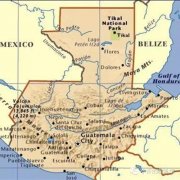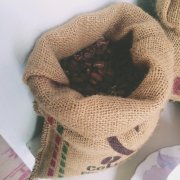Antigua Coffee, the second coffee producing area in Guatemala
The Antigua Valley (Antigua Valley) is the oldest and best-known coffee producing area in Guatemala. Volcanoes and extremely shallow groundwater levels form a dry microclimate, characterized by low humidity, adequate sunshine and cool nights.
Antigua is a closed valley surrounded by three volcanoes: Agua, Acatenango and Fuego. Antigua is flat and slightly sloping, unlike other coffee producers located in volcanic areas.
Most coffee trees are planted in the hinterland of the valley, but even so, they have reached an altitude of 5000 feet; in addition, some farmers grow coffee on the slopes of volcanoes, nearly 5600 feet above sea level.
The extremely high content of pumice (pumice) in the soil of Antigua (from the active Fuaigo volcano Fuego) keeps the humidity stable at 65% all the year round, which is very different from other volcanic coffee producing areas, where the humidity usually varies greatly between the dry and wet seasons.
Fertile volcanic soil, low humidity, plenty of sunshine and cool nights all make Antigua unique.
The three majestic volcanoes Agua, Acatenango and Fuego surround the Antigua Valley. Every once in a while, Fuego-- one of Guatemala's three active volcanoes adds fresh, mineral-rich ash to the soil of Antigua. The volcanic pumice in the soil can keep the soil moist, greatly making up for the lack of precipitation in Antigua, which is the least rainy of the eight coffee-producing regions in Guatemala.
Like all Guatemalan boutique coffee, Antigua coffee is grown in shade. In Antigua, shade is mainly used to protect coffee trees from frost, which is cold and sometimes frosty from December to February every year. Dense shade and extremely shallow aquifers work together to create a unique micro-climate for the coffee trees living in it.
Cup reviews of Antigua coffee:
Aroma 7.8; flavor 7.85; acidity 7.95; balance 7.63; overall 7.78; alcohol 7.85; aftertaste 7.60
Delicate, well-balanced, with rich aromas and excellent sweetness.
Elegant, well balanced with a rich aroma and a very sweet taste.
Image above: a bird's-eye view of the historic Antigua Valley
Important Notice :
前街咖啡 FrontStreet Coffee has moved to new addredd:
FrontStreet Coffee Address: 315,Donghua East Road,GuangZhou
Tel:020 38364473
- Prev

World Coffee Tour A big coffee producer in Guatemala and Central America
Guatemala is a big coffee producer in Central America, ranking eighth in the world in terms of output. Guatemala, whose name comes from the Mayan language, means thelandofmanytrees, the country of the forest. Located in Central America, it is known as the pearl in the crown of China and the United States. Although Guatemala has a limited land area, it has a rich and diverse climate. A country famous for lakes and volcanoes, volcanic soil,
- Next

Natural coffee plantations in Guatemala Coffee plantations in Guatemala
The Republic of Guatemala borders Mexico to the northwest and is the largest and most populous country in Central America. Guatemala's natural climate and soil conditions make it an excellent environment for coffee growing. Due to the large number of archaeological discoveries, the BBC believes that Guatemala is the birthplace of the world's first human civilization and has helped the country find a steady stream of tourists.
Related
- Detailed explanation of Jadeite planting Land in Panamanian Jadeite Manor introduction to the grading system of Jadeite competitive bidding, Red bid, Green bid and Rose Summer
- Story of Coffee planting in Brenka region of Costa Rica Stonehenge Manor anaerobic heavy honey treatment of flavor mouth
- What's on the barrel of Blue Mountain Coffee beans?
- Can American coffee also pull flowers? How to use hot American style to pull out a good-looking pattern?
- Can you make a cold extract with coffee beans? What is the right proportion for cold-extracted coffee formula?
- Indonesian PWN Gold Mandrine Coffee Origin Features Flavor How to Chong? Mandolin coffee is American.
- A brief introduction to the flavor characteristics of Brazilian yellow bourbon coffee beans
- What is the effect of different water quality on the flavor of cold-extracted coffee? What kind of water is best for brewing coffee?
- Why do you think of Rose Summer whenever you mention Panamanian coffee?
- Introduction to the characteristics of authentic blue mountain coffee bean producing areas? What is the CIB Coffee Authority in Jamaica?

